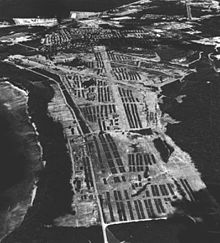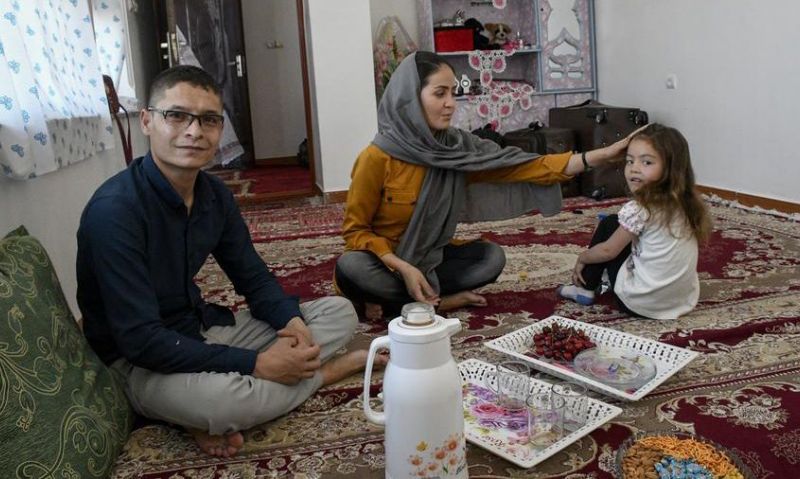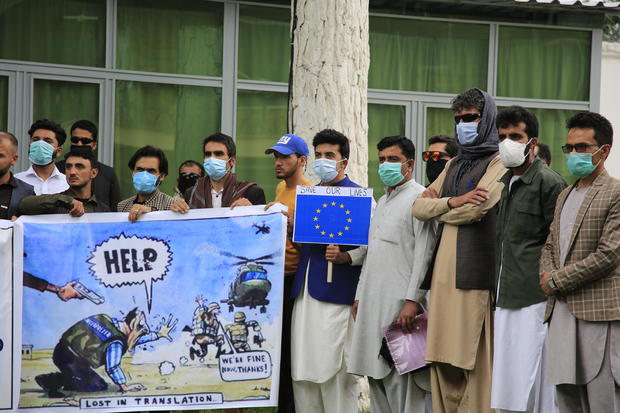American Betrayal Again? Thousands Left Behind in Afghanistan?
Jun 17 2021As in Vietnam, as in Iraq, as in Syria, the United States has left behind the thousands who helped our military in Afghanistan. In his headlong rush to pull out the troops, pressing for mid-July rather August 31: Just as forecast, as a result of Joe Biden's haphazard, unplanned evacuation, America has betrayed thousands of Afghans who helped our country and who now face a Taliban now seeking them out for torture and murder.
than his original September 11 deadline, President Biden seems only at this last minute to have discovered that we are entirely unprepared to rescue the interpreters, drivers, cultural advisers, security guards, many of whom have been embedded with our troops, living with them at remote firebases, risking their lives on combat patrols, and now face inhuman retribution by the Taliban for their having rendered essential service to the U.S.
He pledges that thousands of Afghan interpreters for the US military will be evacuated as American forces leave. He has no idea how and perhaps should worry that he faces his own Saigon moment. Republicans will absolve themselves and be merciless.
can do?There is a backlog of 18,000 who have applied for the Special Immigrant Visa meant for them, a total of perhaps 70,000 people counting their family members, who are stuck in the bureaucratic hairball of an absurdly copious vetting process that seems not to recognize that these workers had already been screened before their employment and went on to prove their loyalty performing valuable service alongside the military, the diplomatic corps, and contractors. Vetting takes an average of three and a half years to process a single applicant, and some wait much longer. This was once a country that turned on a dime to supply allies with armament in World War II and, at peak, produced 17 B-17s a day.
But the cavalry has arrived! "Lawmakers Rush to Help Afghans Seeking Visas for Helping the U.S.", said a New York Times headline. A mix of 16 Republicans and Democrats in Congress has woken at this late hour to signal their virtue with a call for simplification of the clearance process, about which they can do nothing. That role lies with an executive branch that has no plan. Faced with the same lack of foresight, we evacuated 111,000 Vietnamese to Guam when we scrambled out of that war, and that again seems to be the only option. But first, the Taliban have been on the move taking districts all over the country, so how in a few short weeks can 70,000 from all over Afghanistan make their way to Kabul for evacuation? Once we've left, how do we airlift 70,000 to Guam? How do we immediately quarter them? Wll the Seabees again build tent cities? How do we then muster food, healthcare, and so on?
Secretary of State Antony Blinken seems blinkered about the problem. He called evacuation “the wrong word,” and argued instead for improving the functioning of the visa program. No rush, Mr. Secretary.
President Trump negotiated a deal with the Taliban in February of 2020 that our troops would pull out by the May 1st just passed. (In an October tweet he then said he wanted them out by last Christmas, ignorant of logistics). Trump worsened the visa backlog, says Representative Jason Crow (D-Co), a former Army Ranger who served in Iraq and Afghanistan, by starving the program of resources and staff. He and his administration passed on the mess to Biden having developed no plan for bringing out Afghans who assisted us. Nevertheless, it's now Biden's problem, who until now has been equally oblivious. He should be alarmed that this is shaping up as his Saigon moment.
We have been here beforeFour-star Gen. Barry McCaffrey recently said, "I'm still sick to my stomach the way we handled Vietnam". A company commander then with the 1st Cavalry he says, "We left them in the lurch".
When Saigon fell to the North Vietnamese, those who worked for the Americans faced death. The Communist regime sent many of those who had fought against it to brutal “reeducation camps” where thousands are thought to have died.. The 111,000, first in 
Tent city on Guam after Vietnam evacuation/ AP
tent cities, were then brought to military bases in the U.S. to await processing. Those not evacuated took to the sea as so-called "boat people" over the next 20 years to escape Communist rule.
In Vietnam it was a matter of the military itself in addition to interpreters and helpers. "I lived and worked with members of the South Vietnamese military. I counted them as friends", said Jim Jones, a Vietnam combat veteran who became a Idaho attorney general and Idaho supreme court justice. "I gladly trusted them with my life." The U.S. government had a moral obligation to extract as many of its allies as possible, but instead we abandoned thousands, he says.
Iraqi lives didn't matterThe refugee problem caused by ISIS overrunning northern Iraq prompted Congress to create in 2008 the Special Immigrant Visa (SIV), which is the means by which most who helped Americans apply for entry to the U.S.
Yearslong delays in processing the visas ensued, while, said one report, thousands who assisted the U.S. mission were kidnapped, tortured, their lives threatened, forcing them to go into hiding. Many were killed by the insurgents.
Allen Vaught, serving as a captain in 2003-2004, helped two families settle in Texas, and has spent years lobbying for a third, who fled to Egypt to escape retaliation. But two other translators who aided his unit were executed, "And the way they killed them was gruesome. One of my translators was burned alive".
A group of nine Iraqis sued the departments of State and Homeland Security after waiting more than four years after submitting their applications. About one of the plaintiffs Green Beret Col. Richard Welch said, "You cannot overstate the impact he had in stabilizing the Ghazaliya district that spared countless U.S. and Iraqi lives". Another "terp", military argot for interpreter, became a target of car bombs; the military intercepted a phone caller who threatened to kidnap his son. A third was abducted and tortured by militiamen. Waiting for the "nearly impossible "vetting, one spoke for all of them: "My life has stopped for years".
Brad Wenstrup, an Ohio Republican representative is a colonel in the Army Reserve. As a combat surgeon he relied on Iraqi translators when he served in Iraq as a combat surgeon. Two were killed in surprise attacks near Abu Ghraib. A third who ultimately got a visa is now a U.S. citizen and a cardiologist in Ohio. “They become your brothers and sisters”.
the sudden exit from syriaThe U.S. supplied air support, but it was the Kurdish-led Syrian Democratic Forces (SDF) who fought the five-year ground war against al-Assad and who suffered an estimated 11,000 of their number killed.
Yet Donald Trump suddenly decided to pull out of Syria and leave the Kurds at the mercy of the Turks and the Russians. The Turks consider the SDF an extension of the PKK, a Kurdish militant group at the eastern end of Turkey who fight for independence from his country and are viewed by President Recep Tayyip Erdogan as terrorists. The presence of U.S. troops acted as a buffer preventing the Turks from massacring the Kurds, but Trump in a single phone call gave Erdogan the green light to invade Syria in a stunning act of betrayal. The Kurds had imagined they were in a partnership with the U.S., a view that seems foolish given Trump's legendary loyalty to no one. We turned our backs as Kurd towns were shattered by "terrifyingly indiscriminate Turkish artillery barrages and air strikes". It told the world that the U.S. can longer be relied on.
afghan fears mount
In December, Maj. Naiem Asadi, an Afghan helicopter pilot reputed to have killed more insurgents than anyone else in the Afghan air force, was denied entry to the U.S. and even made to 
Afghan pilot Maj. Naiem Asadi and family safe in the U.S.
leave the safety of a U.S. military base in Afghanistan, forcing him and his family to go into hiding. “Find him and kill him” read a Taliban online post with his photograph. After six years in the fight, 3,000 flight hours, and hundreds of missions — one providing air cover for an American pilot waiting for rescue after his plane crashed — our Department of Defense decided to consider him a deserter from the Afghan military for finally wanting to leave the service and go to the U.S.
The injustice drew enough outrage that Maj. Asadi and family are now safely in the United States, but it exhibited the DoD stateside blindness of what goes on worlds away in the battlespace.
Matt Zeller, from a military family in upstate New York, says interpreters are "your eyes and ears, your best early warning signal". He was a lieutenant leading 14 soldiers in Afghanistan's Ghazni province when his unit was ambushed by the Taliban, outnumbered three to one. He said, "My terp was more important to me than my weapon". He was not exaggerating. Regaining consciousness after a mortar hit, two Taliban were advancing to kill him when he felt someone drop in next to him and open fire. His terp killed the Talibani.
Stateside, Zeller successfully worked to bring in Janis Shinwari, his interpreter, and crowdsourced $35,000 to give his family a start here, but Mr. Shinwari proudly refused the money, wanting to make it on his own. Zeller used the money to start No One Left Behind, a non-profit that works to cut through the red tape and bring into the U.S. those who helped us. His organization has tracked the killings of more than 300 translators or their family members since 2014, many of whom died while waiting for their visas to be processed. 
Afghan interpreters asking not to be forgotten
The interpreter who fought alongside former Marine Ben Wormington was still waiting for a visa in 2019 after applying in 2008.
“He’s like a Marine to me. A Marine that we’ve left behind. If they stamped his passport, I would pay for his flight and his family would live in my house in Omaha.”
The danger in Afghanistan is such that he cannot tell even his children about his past. A slip of the tongue could cost his family their lives.
plugging the pipelineCongress authorizes the visas and has dragged its feet, parsimoniously doling out a few at a time, often with nativist overtones in their debates. In 2016, at a time when 10,000 more were needed, it voted piecemeal — only 1,500 additional visas, despite the best efforts of Senators John McCain and Jeanne Shaheen. "People are going to die", said McCain on the Senate floor, in rebuke of a fellow Republican who was blocking visas. "Don't you understand the gravity of that?"
In 2016, Republican Senators Chuck Grassley of Iowa and Jeff Sessions of Alabama questioned the necessity of the program and argued for shutting it down, seeking to be in the good graces of Donald Trump, the party's presidential nominee who was inveighing against refugees and immigrants. Senate rules permit a single senator to put a hold on legislative items and Mike Lee of Utah actually used that rule to block the amendment for additional visas altogether from the 2016 defense authorization bill. Shaheen, a Democrat from New Hampshire, continues today to press the administration to honor our commitments.
Two months into his presidency, just after he banned residents of six Muslim countries from entering the country, Donald Trump also shut down the special visa program, even though Afghanistan was not one of the six. His original ban had included Iraq, leaving those who had supported American forces exposed to reprisals. Afghans were told to no longer apply for special visas.
Trump in 2017 cut the overall refugee quota in half to 50,000. Overall, by 2019 some 110,000 Iraqis were waiting to be approved by the refugee program, a number that included the special visa program for those who assisted us. Mr. Trump would subsequently cut the cap four straight years, ultimately to 15,000, the lowest in the program’s four decade-long history.
In fiscal 2019 only 153 Iraqi refugees whose applications were given high priority were admitted, down from a high of 9,829 in 2014, according to government data. One was Suhad Munshid, who resettled in Missoula, Montana. Her family home had been used as a safe house for American troops. She had waited nearly seven years after she applied. For 2020, Trump capped the subset of those who assisted U.S. troops and personnel at 4,000. His administration ultimately admitted only 161 Iraqis. Talking in his ear was his immigration czar, Stephen Miller, who was quoted as saying, "I would be happy if not a single refugee foot ever again touched American soil".
sclerosisThe biggest hurdle, says Mr. Zeller, is bureaucracy. “To the government, these guys are refugees,” he says. “To me and the others who fought there, these guys are fellow vets." Nevertheless, they are saddled with the cumbersome, multi-part process of endless paperwork that seems to have become America's specialty. They have already proven both themselves and their loyalty, have done far more for our country than most Americans, yet have to be cleared by multiple security agencies from the FBI and CIA to the NSA.
For refugees the process can include requiring them to track down people they served with years ago to write a recommendation. Applications require a “credible sworn statement” recounting a specific threat as if assisting the U.S. does not automatically mean they are threatened with retribution.
"All the bureaucratic incentives” work against clearing visa applications from conflict areas, is how Steve Miska, who did three tours in Iraq and teaches national security at the Marine Corps University, put it. “No government agency wants to be put on the blame line for allowing a terrorist into the country”.
who are we?How in any future conflict will any nation view America as trustworthy if we betray once again the promises we made to those willing to assist us? "I think many nations around the Middle East now are considering major changes in their strategic defense plans because they no longer see the United States as a reliable ally", was one reaction, this from an organization in Cairo.
Travis Weiner's interpreter was killed in Iraq waiting for a visa for which he had applied years earlier. The two-tour Army infantry veteran spoke for many who served in Iraq and Afghanistan and know their value.
“If people’s emotions about immigration are such that they are willing to tolerate literally leaving our wartime allies behind on the battlefield because they’re foreigners and they look different, then we really need to do a gut check about whether we really are the people we say we are.”
Please subscribe if you haven't, or post a comment below about this article, or
click here to go to our front page.

